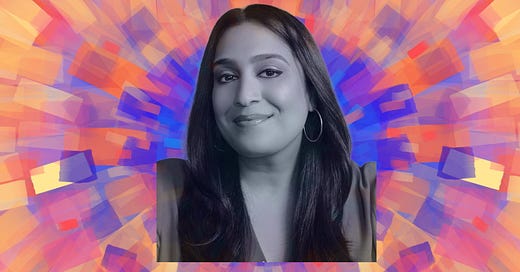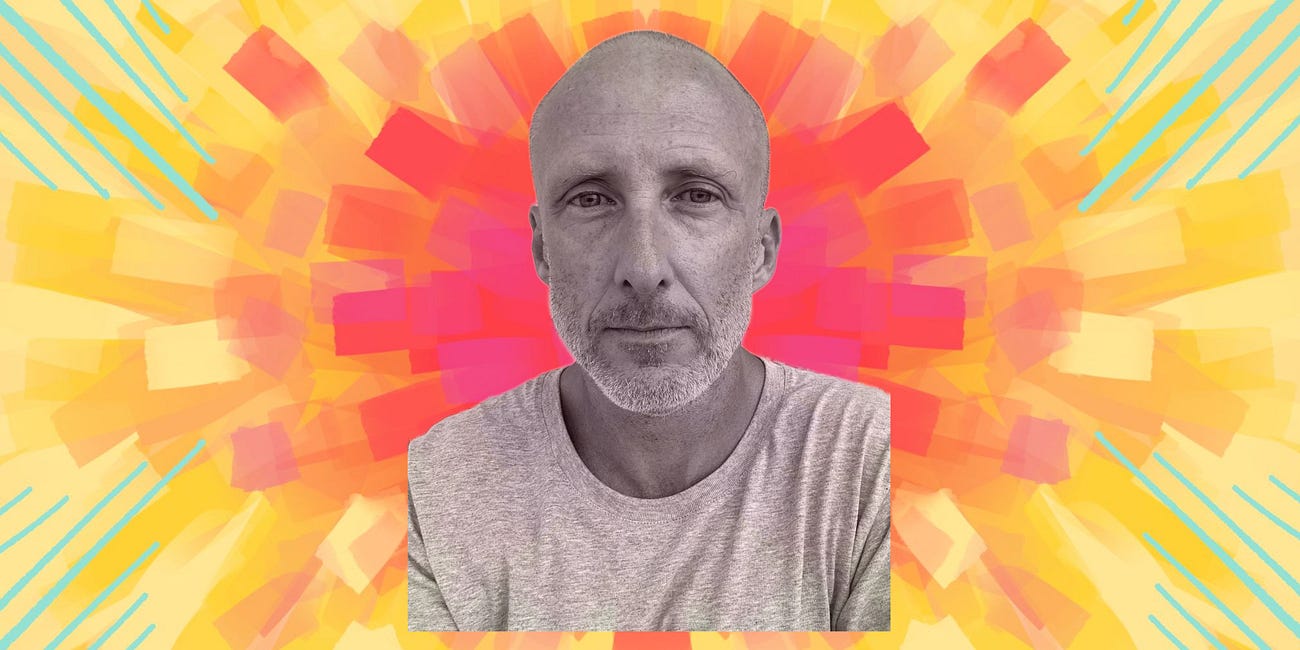Healings FAQ No. 8: Puja Patel
A Q&A about death and god: "I find myself chasing god every time I’m dwarfed by nature or blissed out of my mind on a dance floor."
Greetings and happy Father’s Day, and apologies for not wishing those who celebrate a happy Mother’s Day back when we did this a few weeks ago. It’s not that we don’t like mothers! (I mean, we like them alright—TBH there’s a kind of battle-of-the-sexes rivalry that I’ve found attends new parenthood, where you’re constantly wondering (or at least I’m constantly wondering) did the baby giggle more expressively at mom’s silly faces? Was that a bigger hug? Does she like it better when mommy reads the story instead of me? I know…insane.) Anyway, like I said it’s not that we don’t like moms, it’s more just that today actually feels like a Father’s Day post.
That’s because today’s Healings FAQ contestant is Puja Patel, and Puja’s responses, which are generally amazing and at times disarmingly frank and beautiful (plus feature quantum physics), are rooted in the feelings she shares about her father’s passing a few years ago—how that event shaped her outlook on death, god, faith, and all the related topics we talk about in this space. It’s heavy stuff, but also heartwarming in its way, and that’s why we’re here, right?
Ah, but I forgot the intro. Let’s do that: Puja is a writer, editor, and the rare person who’s earned the distinction of media impresario. As the Editor in Chief of Pitchfork for the last roughly six years, Puja transformed that storied institution from a fusty if influential music site that had a hard time outgrowing its Chicago indie snob roots, into a global publication with a diverse staff that expanded and evolved the definition of music criticism in several directions at once. Her success was apparent to anyone paying attention, except of course the brass at Conde Nast, which laid off Puja and most of her staff this past winter, marking the end of an era. Now, I have it on good authority that Puja will be just fine, but music journalism will probably never be the same. But hey, I’m sure the billionaire owners of Conde’s parent company, Advance Publications (!?), know what they’re doing, right? Sheesh.
Anyhoo! Without further ado, here’s Puja Patel answering the Healings FAQ.
What happens when we die?
I was born into the belief that a person dies and their soul is reincarnated millions of times before it achieves nirvana. There are phases where I commit to that ideology a little more or a little less, but it’s comforting to think about on a logistical level as I go about my life. It’s made me into someone that finds it soothing to contextualize personal wins/losses as part of a beautifully complicated, overwhelming whole. Let’s be clear, I can still be a cynic. But most of my cynicism is around ancient societal systems, and karmic cosmology can’t be colonized. I’m simply one connection in a lineage of generations of love, pain, and evolution, and maybe the good, thoughtful pursuit of a decent life might shape something good for someone else in the future, practically or metaphysically.
Some of this I picked up from my parents, my dad in particular always had a zen optimism about him. Honestly, most of my current feelings about death and spirituality have been formed by processing his sudden Stage 4 cancer diagnosis and death. About two months before he died, I brought some friends home to meet him. One of them was studying and working at NASA, where she was observing experiments in quantum entanglement. (I’m nowhere near qualified to explain quantum physics, but the TLDR is that an entangled pair of particles are connected and affect each other even when they are separated by extreme distances and environmental circumstances. As an article this friend sent my way notes, “it can be helpful to think of them as twins.”) She excitedly told me about experiments in the field that would prove that not only do entangled atoms remember and react to each other through space, but they would continue to do so with millions and billions of light years between them. That means they would viscerally and intuitively react to their counterparts faster than any possible communication could travel between them. She was interested in what that could mean for extraterrestrial intelligence; I caricatured the idea into two atoms who were so cosmically bound that they simply could not quit each other. Aw! Science rocks!
After my dad passed, I couldn’t stomach watching his coffin be put into the fire that would cremate him, but I did know that suddenly, scientifically and spiritually, he was everywhere all at once. My mom, brother, and I took some of his ashes to India, where we spread them into a tributary of the Ganges from a little wooden boat. One of his brothers took some of his ashes to his home country of Zimbabwe, and there were some at my parents’ house, where he would spend hours contentedly watching the birds flit from tree to tree. I like to think that those parts of him—spread all across the world in different places that represent home—are moving and reacting to one another through distance and time. (It’s possible that I have bent the laws of science to my will… but hey, that’s why we’re here.)
On a scale of 1-10, with 10 being terrified and 1 being it’s never crossed your mind, how afraid are you of dying? Explain.
Probably around a 3 or 4? My mom has worked in nursing homes and hospitals my entire life and sometimes I’d volunteer or tag along with her as a kid. I’d hear about patients I had met dying a few weeks later, or look for an elderly friend that I had made on my last visit only to find that their memory of me was limited to a small window due to their dementia. There were the patients who were full of life and incredible stories, but there were also the ones who had language barriers that made explaining food preferences or pain difficult at best and miserable otherwise, the ones whose families never came around, the ones who asked if they could just die already. (Healthcare workers really are heroes.) I think that made me come to terms with death at a pretty young age. It also made me realize that being alone while you were dying was much scarier and sadder than death itself. My fear of dying doesn’t touch my fear being forced to live in pain and loneliness or watching those I love die before me.
What’s the closest you’ve come to death? What did you learn, if anything?
I’ve been lucky thus far and hope that answering these questions doesn’t jinx that. The closest I’ve felt to death is being with my dad and grandmother as they died. Having done it twice, I’ve learned that you can really feel a life leave a room, even if the light’s been dimming over time. I’ve also learned a number of things about what happens to the human body as it begins to shut down. I’ll spare you all that.
The most useful thing that I can impart is to plan for your death when you’re still in good health, if only for the sake of your loved ones. My brother and I were lucky my parents were such planners and that my mom is the most organized person on earth. Even still, there’s truly no worse or more dissociative feeling than sorting the logistics of the death as you’re grieving; signing organ donor agreements, calling funeral homes, choosing coffins and urns, sending texts and emails to people who should know, printing death certificates. The number of forms alone, the raw indignity of proving death and your relationship to the deceased to change a AAA membership, turn off a cellphone plan, or update the password to the family Hulu account. It’s awful.
Do you believe in God? Explain.
What I don’t believe in is a hierarchy dependent on rigid frameworks, strict ceremonial duty, judgment, and self-loathing like we’re living in some kind of video game where the Final Boss is gatekeeping absolution. That’s to say that I struggle with religious essentialism around God but not what God represents. If godliness is meant to describe something so unfathomably beautiful, spiritually pure, inexplicably powerful, and objectively good at once, then I find myself chasing god every time I’m dwarfed by nature or blissed out of my mind on a dance floor. Have you ever been in the desert at night, looked up at the stars, and seen the Milky Way? Hindus are raised to believe in many gods, we’re taught to see god in the sun and the moon, in parents and teachers, in plants and animals, in generosity and selflessness. My grandfather prayed to the sun every morning and my mom lights a diya and incense every day; I believe that this is their way of communing with god.
A day or two before my dad passed, when he could barely speak, his siblings and their families gathered around his hospital bed. He was trying to stay awake, asking over and over when the fifth and last of them—his eldest sister, a kindred spirit—would get there. As soon as she arrived, he mustered the strength to bring everyone close around him and say what would be his final words to us as a group—“Enjoy life,” he said, his voice cracking. Then he brought his hands together so his fingers interlocked and added, “Together.” In that moment, I saw god. Does this answer the question?
Do you have a spiritual practice? If so, what is it? If not, why not?
I have habits picked up from tradition. I say a short, two-second mantra passed down from my grandmother and mom every time I leave my house for a big trip or something important, usually in my head and sometimes quietly out loud. Otherwise, I truly think of spending time with music, going to see it live, or purposefully going dancing as a spiritual practice. As someone who has worked in music for the majority of my adult life, I’m allergic to the idea that math and science alone can explain subjective, individualized feelings. Imagine the magic of a song being reduced to its strictest building blocks to explain why you’re drawn to it; a progressive chord change signals “happy” to your brain, makes you feel good, bleep bloop. How boring! As silly as it might seem, my spiritual practice is taking a walk or a drive with some music and letting it bring me to where I want or need to be.
This is the Healings Newsletter. We thank you for reading. If you enjoyed it, why not share it with a friend, or better yet buy them a gift subscription.
Healings is written by Garrett Kamps and edited by Tommy Craggs. Ayana H. Muwwakkil provides art direction.
Healings is about illness, recovery, spirituality, and related topics, and began in the summer of 2023 as a chronicle of Garrett’s battle with cancer. We make no guarantees that it will hold together, thematically speaking, now or ever.
Healings is free for all, but if you can support our efforts with a paid subscription, we’d really appreciate that. A portion of all proceeds goes to the Patient Advocate Foundation.
Further Reading:
Healings FAQ No. 7: Philip Sherburne
Hello and welcome to another installment of the Healings FAQ, where I ask the same series of questions about death and faith to a collection of writers, artists, musicians and maybe eventually some other notable public figures (looking at you, Guy Fieri). Why am I asking these specific questions? Be…







